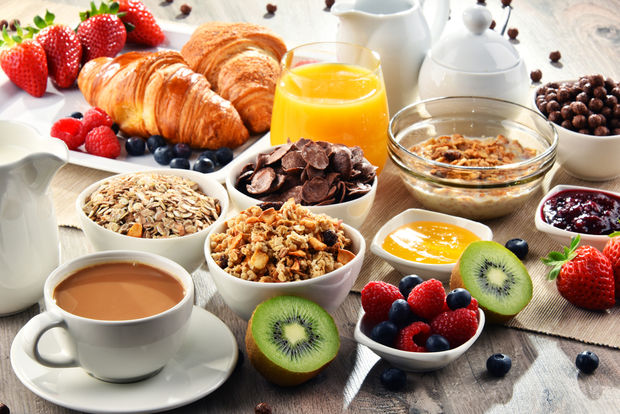(单词翻译:单击)
Grape Nuts was one of the first American cereal brands.
“葡萄坚果”是美国最早的麦片品牌之一。
It claimed it could "steady a man's nerves" and "clear his brain."
据称,它可以“提神醒脑”。
It could keep you cool in the summer.
能够让你在夏天保持凉爽。
It was food for muscles.
它是肌肉的粮食。
For "the warding off of disease."
专为“预防疾病”。
And for "men of brains."
专为“有头脑的人”打造。
It was the "most scientific brain and nerve food in existence."
它是“大脑和神经现存最科学的食物”。
These ads might seem ancient,
这些广告可能看起来已经有些年头了,
but in connecting breakfast cereal with health,
但在把早餐麦片和健康绑定起来这一点上,
they aren't so different from how breakfast has been sold to us ever since.
它们和一直以来商家们给我们推销早餐的方式并没有多大不同。
"Cheerios breakfast gives you the power protein."
“早餐吃将军麦圈,补充能量蛋白质。”
"How do I stay so slim? I watch what I eat, like Post Grape Nuts for breakfast."
“我怎么保持身材的?不乱吃东西,比如早餐就选葡萄坚果。”
"Data shows women who eat breakfast tend to weigh less than those who don't."
“数据显示,吃早餐的女性往往比不吃早餐的女性苗条。”
The problem with a lot of these claims is — they're not exactly true.
这些说法的问题在于,它们并不完全正确。
But the idea of breakfast being good for health — especially weight loss — has persisted for over a century.
但早餐有益健康——尤其是有益减肥——这一观念已经延续一个多世纪了。
So where does this myth come from?
那么,这个神话究竟是从何而来呢?
And what does this guy have to do with it?
它和这个哥们儿又有什么关系?
For children there's pretty strong evidence that breakfast is a good idea.
对孩子来说,有充分的证据表明吃早餐是个不错的主意。
That's Julia Belluz who reports on health for Vox.
这位是为本栏目提供健康咨询的茱莉亚·贝卢兹。
As an adult, one of the most common claims we hear about breakfast is that it really promotes weight loss.
作为成年人,我们最常听到的,关于早餐的说法之一就是,早餐真的非常有助于减肥。
And that idea didn't come out of nowhere.
而这个主意并不是无中生有来的。
There's a whole body of research that connects breakfast with weight loss.
把早餐和减肥联系在一起的研究有很多。
But the methods behind a lot of those studies don't always hold up.
但支撑很多这类研究的方法并不总是站得住脚的。
Like this one, that found an association between eating breakfast, and having a low body mass index.
就比如发现了吃早餐和低体重指数之间的联系的这个研究。
That might be true, but studies like this aren't actually testing what would happen if you were to change your breakfast behavior.
这一研究结果或许没错,但是,像这样的研究并没有真正测试你改变你的早餐习惯后会发生什么。
"The problem with those studies is that breakfast skippers and breakfast eaters are different people.
“这些研究的问题在于,不吃早餐和吃早餐的并不是同一群人。
So maybe the breakfast eaters earn more money and exercise more and that explains why they weigh less than the breakfast skippers."
也许吃早餐的人赚的钱更多,锻炼的也更多,而这想(些因素)就(已经)解释了为什么他们比不吃早餐的人体重轻这个问题。”
Most of these studies also don't take into account a major factor: what we eat for breakfast.
而且,大多数这类研究也没有考虑到一个主要因素:我们早餐到底吃了什么。
There's likely a big difference between eating a bowl of Fruity Pebbles, or a bowl of steel cut oats.
吃一碗水果麦片和吃一碗钢切燕麦片可能还是有很大的区别的。
There was even a study of studies...that tried to answer the question:
甚至还有一项研究其他这类研究,试图回答这个问题的研究:
does our best research on breakfast prove that it helps with weight loss?
最成功的研究早餐的研究是否这你的证明了早餐有助于减肥?
Researchers looked at 13 randomized controlled trials,
在那项研究中,研究人员观察了13组随机对照试验,
the highest quality of evidence, on breakfast and its effect on weight loss.
寻找关于早餐及其减肥效果最有用的证据。
When researchers looked at the studies...
当研究人员对这些研究展开分析时……
they found there's "no evidence to support the notion" that eating breakfast helps you lose weight.
他们发现,“并没有证据佐证了”吃早餐有助于减肥这一观点。
"And they found that breakfast might even had the opposite of the desired effect.
“(不仅如此,)他们还发现,早餐甚至还可能对减肥起到反作用。
In some studies people actually gained a little bit of weight when they started to eat breakfast."
在一些研究中,受试者开始吃早餐后体重实际上还增加了一点点。”
So if the available science doesn't actually support this idea,
那么,如果现有科学研究并不能证明这个观点,
why do we still believe eating breakfast is a healthier way to live?
那我们为什么还相信吃早餐是一种更健康的生活方式呢?
Well, it has a lot to do with these guys.
原来,这一点跟这些哥们儿有很大的关系。
Before they got into cereal, Dr. John Harvey Kellogg and his brother Will Keith Kellogg, ran a family business...
在加入麦片行业之前,约翰·哈维·凯洛格博士和他的兄弟威尔·基思·凯洛格经营着一家家族企业——
The "Battle Creek Sanitarium."
“巴特克里克疗养院”。
It was a wellness center, a place where the wealthy could go for what they called "biologic living".
这是一个健康中心,富人可以来这里过他们所谓的“生物生活”。
It included things like salt glow baths, light treatments, and strange looking exercise machines.
这里有搓盐浴,光疗,和各种奇奇怪怪的健身设备。
It was there in 1898 that John Harvey came up with corn flakes, as a way to curb indigestion.
也就是在那时,也就是1898年,约翰·哈维发明了玉米片,作为一种抑制消化不良的食物。
But he was also an extremely religious doctor who believed masturbation was a carnal sin.
但他同时也是一名非常极端,认为自慰是肉体的一大罪过的宗教医生。
And he prescribed a bland diet, including corn flakes, as part of the cure.
作为(消化不良)治疗的一部分,他会开一种含有玉米片的清淡饮食疗方。
In 1906, John Harvey's brother, Will Keith, took corn flakes, and mass-marketed them to the world.
1906年,约翰·哈维的弟弟威尔·基思将玉米片大规模推介给了世界各地。
By 1917, Good Health, a magazine edited by John Harvey Kellogg,
1917年,约翰·哈维·凯洛格编辑的杂志《健康》写道:
wrote "In many ways, the breakfast is the most important meal of the day."
“从很多方面来看,早餐都是一天中最重要的一餐。”
With claims like this, cereal makers solidified the idea of a healthy breakfast.
有了诸如此类的说法,麦片制造商们进一步巩固了“健康早餐”这一理念。
"It repairs and it sustains all body tissue."
“它能修复并维持所有身体组织的机能。”
"It's part of your good breakfast."
“一顿丰盛的早餐离不开一碗麦片。”
And today, a lot of the science cited in cereal commercials has a similar source.
如今,很多麦片广告援引的几乎都是同一个科学依据。
"Part of a good breakfast."
“一顿丰盛的早餐离不开一碗麦片。”
Take a look at the small print on these studies.
看看这些研究中的小字部分。
This one concludes breakfast skipping is not good for managing weight.
这篇文章的结论是,不吃早餐不利于减肥。
It's funded by the Kellogg Company.
而这项研究得到了凯洛格公司的资助。
And this one found breakfast skipping had other health costs — like high cholesterol.
这项研究则发现,不吃早餐会导致其他健康问题,比如高胆固醇。
It's funded by another major breakfast maker, Quaker Oats.
它则得到了另一家主要的早餐制造商——桂格燕麦公司的资助。
So, knowing all this about the slippery science of breakfast — should we still be eating it?
那么问题来了,既然我们已经知道了早餐这门狡猾的科学的前因后果——我们还应该吃早餐吗?
There's little evidence that it's a great weight loss strategy...but that doesn't mean breakfast is bad.
虽然没有什么证据表明早餐是一个很好的减肥策略……但这并不意味着早餐就不好。
"For a lot of people breakfast isn't pointless.
“对很多人来说,早餐都不是毫无意义的。
It can be a good time of day to stock up on vitamins and nutrients.
它是一天中储存维生素和营养的一个好时机。
But for the rest of us, it's up to you."
但对其他人来说,吃不吃就看你个人了。”
That means, if you're a breakfast eater, like Julia, you can carry on.
换句话说,如果你和像茱莉亚一样是个吃早餐的人,那你可以继续吃下去。
And if you're a breakfast-skipper, like me?
如果你和我一样都是不吃早餐的人呢?
Don't worry, the best science we have suggests we're probably just fine either way.
别担心,目前最佳的科学研究表明,吃不吃可能都OK的。


